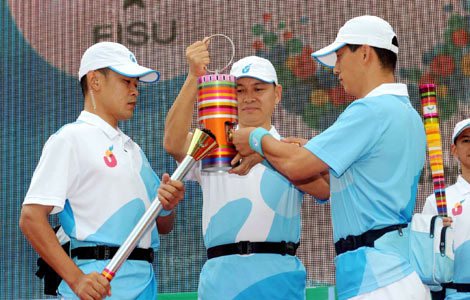Authority steps in to prevent blackouts
Updated: 2011-08-12 08:08
By An Baijie and Huang Zhaohua (China Daily)
|
|||||||||||
NANNING - A South China county has placed limits on the amount of electricity that can go to companies that consume large amounts of energy in response to local residents' complaints about frequent blackouts.
An official from the publicity department of Tengxian county, in the Guangxi Zhuang autonomous region, said many local villages have been subject to power shortages for months.
"It's a fact that we don't have enough electricity," said the official, who didn't want to give his full name. "But the only thing we government officials can do is to use our air conditioners less often."
To maintain an electricity supply for local residents, the government has decided to restrict the power use of a pottery company, several titanium powder factories and other enterprises, all of which contribute greatly to the local economy.
Mo Yunxia, a farmer in Tengxian, said she has seen frequent blackouts in recent times. Whenever they happened, it usually took from two to three hours for the power to be restored.
"After we would come back in from the farm at noon, we would feel unbearably hot because the electric fan would not work during the blackouts," she said.
Wang Yuanmei, a local woman, said blackouts always "come out of the blue" without any warning from authorities.
"I remember one day when the power wasn't restored until 2 am, and it was cut off again at 6 am," Wang said. "The weather forecast said that it's going to rain soon, which may bring down the high temperatures."
During the recent blackouts, local villagers have often lit candles at night and slept on their roofs because their houses were too hot inside and their electric fans did not work.
Yang Xueji, a resident in Dali township, said she has not cooked for days because her electric pan will not work without power.
"The vegetables in the refrigerator rotted because the electricity was cut off," Yang said. "It made me sad."
The autonomous region is seeing its most serious electricity shortage in the past two decades, leaving nearly 30 percent of the region's demand for electricity unmet, said He Jiyuan, deputy director of the power supply bureau of Nanning, capital of Guangxi.
Guangxi's capacity to produce electricity falls about 3.5 million kW to 4 million kW short of being able to give the region what it needs. Every day in recent weeks, the amount of Guangxi's power shortage has come to between 80 million kWh to 90 million kWh, which means 30 percent of the region's demand for electricity is not being met.
The Ministry of Industry and Information Technology released an emergency notice on May 10, saying measures should be taken to ensure the electricity supply remains stable for residents and for public purposes and that power grids should not be turned off to control the use of power.
The National Development and Reform Commission said in June that local governments will face punishments if they are found to be rationing electricity.
It said companies that use large amounts of energy should not be able to draw heavily on the power grid and that schools, hospitals and residents should have a guaranteed supply of electricity.
Related Stories
Guangxi faces most severe power shortage 2011-08-01 16:54
Electricity use is expected to peak in August 2011-07-30 09:59
Massive electricity transfer quenches power thirst 2011-07-28 16:13
Power runs short in South China 2011-08-02 07:34
Hot Topics
Anti-Gay, Giant Panda, Subway, High Speed Train, Coal Mine, High Temperature, Rainstorm, Sino-US, Oil Spill, Zhu Min
Editor's Picks

|

|

|

|

|

|







